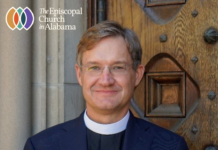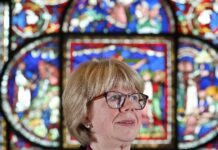Greetings in the name of our Lord Jesus Christ.
Lent is drawing to a close. And as it does, I’m reminded that Lent has no meaning at all apart from Easter.
I mean, why would you fast from foods or other things if you don’t intend to feast when Easter comes? Why would you give up saying or singing the word “Alleluia,” if you don’t intend to shout it on Easter Day?
Lent accomplishes nothing on its own. It accomplishes nothing if it fails to prepare us for the Easter feast.
And so, in about a week, we’ll begin the Easter Solemnity. Solemnity is just an ecclesiastical word that refers to celebrations of the great events in the life of Jesus. And the Solemnity of Easter actually begins on Thursday and runs all the way through Sunday. It’s also known as the Triduum, the Great Three Days of Easter.
Now, if you’re counting, you’re probably thinking Thursday, Friday, Saturday, Sunday–why do they call that three days? It’s four. Well, each day begins on the eve of the previous day. So, the way you count it is evening of Thursday to evening of Friday, one day; evening of Friday to evening of Saturday, two days; evening of Saturday to evening of Sunday, three days. That’s the Triduum of Easter, the Great Three Days.
During that solemnity we remember the works of our salvation. So it begins Thursday, what we call Maundy Thursday. The word Maundy comes from the Latin word mandatum, which means commandment. And on Maundy Thursday, we remember that Jesus said to his disciples in the Upper Room, right before he died, “A new commandment I give to you that you love one another as I have loved you.”
Now, Jesus had said any number of times that his disciples ought to love one another. What made this commandment new was that he said, “as I have loved you.” How is that new? How is that love expressed? Well, that’s what we discover as we move from Thursday into Friday, into what we call Good Friday, when we celebrate the events of the cross. And we remember that Jesus in his love, gave his life up for us to pay a ransom for our sins. Greater love hath no man. We’re told it’s that kind of love that we remember and that we’re commanded. So, Maundy Thursday to Good Friday, and then after Good Friday, Holy Saturday, when one of the ancient homilies of the Church says, “all creation rests on this day because the King is asleep.”
Now, in that homily, it doesn’t mean asleep as in trying to say that Jesus didn’t really die. All throughout Scriptures, death and sleep are equated with each other in ways. I think of Paul in Ephesians 5:14, saying, “Awake, O sleeper, and rise from the dead.” Sleep and death are joined. And so Holy Saturday reminds us that everything is quiet, everything is still, because on that day, the king sleeps.
Finally, finally we come to Easter Day. The joy, the triumph, the celebration, the gladness, the feasting of that day. And with that day, the service that began in sadness on Maundy Thursday—and it got sadder and worse before it got better; here’s the thing, when it was bad, it was really bad, but when it got good, it got really, really good—that one great solemnity, is one service. Here’s how you know it’s one service: because Maundy Thursday and Good Friday have no dismissals and no blessings. It’s like a meeting that’s not adjourned, but just held over. The service on Maundy Thursday is held over to Good Friday. It’s held over to Saturday when, either with the Vigil or Sunday morning with Easter Day, we’re finally come to the fulfillment of everything that began on Monday Thursday. And it’s not until Easter that we get to say again the great Alleluia that reminds us that victory has been won for us.
I want to give you my blessing as we head into Holy Week, into the Great Three Days of Easter. I want to give my blessing to the churches where all of this worship is going to unfold. I want to bless our clergy who are going to be leading us through all of this worship. And I especially want to bless you, the people of our diocese who will walk through these amazing events of the end of our life and the beginning of new life with Jesus and his death and resurrection, his ushering us into our eternal and full life.
And so, as this week comes, I want to remind you that I’m thinking of you. Even if I not with you—if I’m not present in your church during this great season of the Fifty Days—I want you to know that I’m praying for you, and that I will be remembering you and praying that your worship will usher you into the great Alleluia that is Easter.
The Rt Revd Chip Edgar
Bishop of The Anglican Diocese of South Carolina


